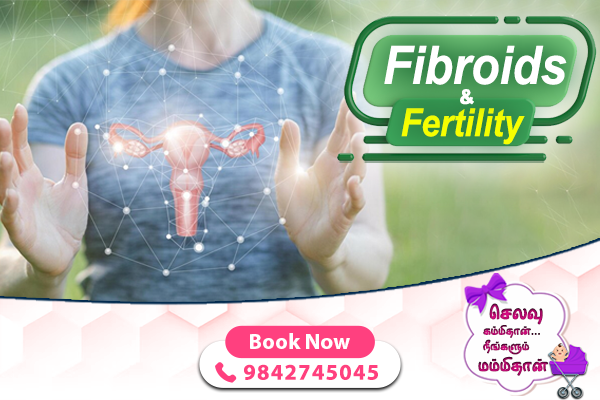Uterine fibroids or myomas or leiomyomas are benign (non-cancerous) tumors of muscle tissue in the uterus. It occurs when a single smooth muscle cell in the wall of the uterus multiplies and grows to form a non-cancerous tumor. Fibroids are found in 20% of women in the reproductive age. Exact cause of fibroid is unknown but there is evidence that it may be due to a combination of genetic, hormonal and environmental factors. Fibroids can be single or multiple. In the uterus these can change the shape or size of the uterus and cervix.
There are 3 main types of fibroids based on the location-
- Subserosal – when fibroids are in the outer wall of the uterus.
- Intramural – when fibroids are present in the muscular layer of the uterus.
- Submucosal – when fibroids are present in the mucosal layer and protrude into the uterine cavity.
Fibroids can be connected to the uterus by a stalk (pedunculated) or attached to nearby ligaments or organs such as bladder and bowel. Rarely fibroids can be found outside the pelvic cavity also.
FIBROIDS AND INFERTILITY
Fibroids are seen in approximately 5 – 10% of infertile women. But whether these fibroids cause infertility or not is dependent on the size and location of fibroids. Symptoms of infertility is more commonly seen in fibroids that are inside the uterine cavity(submucosal) or very large ( > 6cm in diameter) with in the wall of the uterus(i.e intramural).
Most women with fibroids will not be infertile. Women with fibroids and their partners should be thoroughly evaluated to find other problems with infertility before fibroids are treated.
HOW DO FIBROIDS CAUSE INFERTILITY?
There are several ways uterine fibroids can affect fertility.
- Fibroids in the cervix can change the shape of the cervical canal or opening of the uterus which in turn can affect the number of sperm that can enter the uterus.
- Change in the shape of uterus can interfere with the movement of the sperm or embryo.
- Fibroids in the fallopian tube can obstruct it leading to blocked fallopian tube.
- Submucosal fibroid can lead to variation in the thickness of the lining of the uterine cavity.
- Fibroid can affect the blood flow to the uterine cavity which causes difficulties in implantation and development of embryo.
- Some fibroids might be affected by hormonal changes especially during pregnancy. These grow in size (usually in the first 3 months) and might cause problems in pregnancy.
FIBROIDS AND PREGNANCY
The biggest concern in pregnancy is whether the fibroid will increase the chance of preterm birth or miscarriage. Fibroids influenced by hormones can grow in size. There might be secondary changes such as bleeding or hemorrhage within the fibroid called as red degeneration. In some cases, fibroids can outgrow their blood supply and cause severe pain that might even require hospitalization. Fibroids can change the baby’s position in the uterus which can increase the risk of miscarriage, preterm delivery and c – section. Fibroids can result in increased risks of placental abruption as placenta can break away from the underlying uterine wall which is blocked by fibroids.
Management depends on the condition and situation of the pregnant women as suggested by the doctor. Surgery might be rarely needed or performed.
SYMPTOMS OF UTERINE FIBROIDS
Some women who have fibroids may not experience any symptoms. Sometimes fibroids can cause symptoms and might require treatment depending on their location, size and number. The most common signs and symptoms include:
- Heavy menstrual bleeding
- Menstrual clots
- Periods lasting more than a week
- Pelvic pressure or abdominal pain during menstruation
- Irregular bleeding between periods
- Frequent urination.
TREATMENT OF UTERINE FIBROIDS
There are 2 main treatment options to treat uterine fibroids: medications and surgery. To select the most appropriate treatment, it is entirely determined by location and size as well as presenting symptoms and individual’s conditions
SUMMARY/TAKEAWAY
Uterine fibroids are common and can affect fertility in many ways. They can affect whether sperm and egg meet, they can affect whether an embryo can implant, they can affect whether a pregnancy can continue and they can affect the growth and positioning of the baby. But fibroids can be managed easily by your doctor. In case of any further doubts or queries, please be free to contact our experts.

